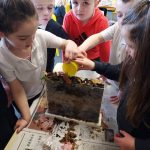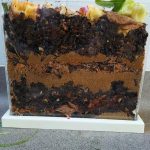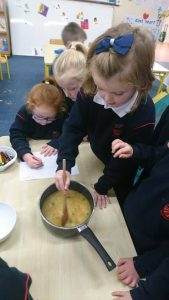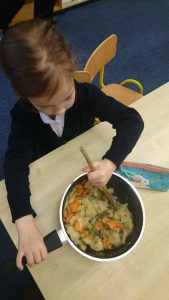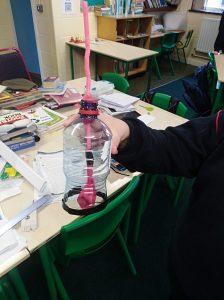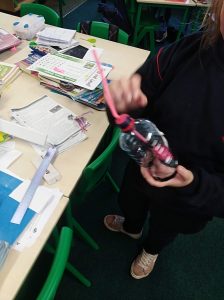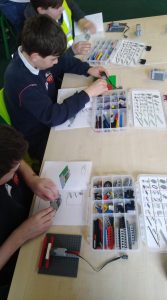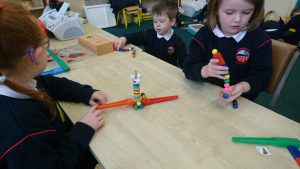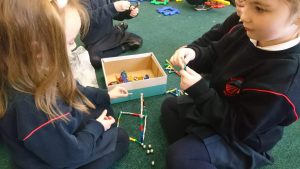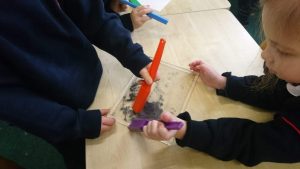Our Science Log 2021- 2022
Step 1: Science
- Living things
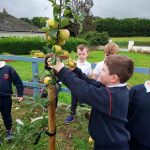
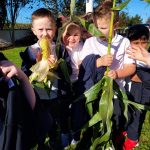
We have been working hard on our school garden, watching our orchard grow and sowing our vegetables.
This year we have planted corn, carrots, onions, peas, pumpkins, potatoes and lettuces. Have a look below at some of the vegetables that we have harvested and eaten this year!
- Energy and forces
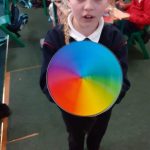
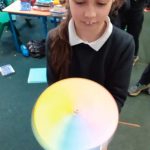
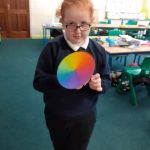
First we learned how to create a circuit to light a bulb. Then we replaced the bulb with a motor. We created a colour wheel and turned it into a spinner on top of the motor. See how the colours almost turn to white when spinning!
- Materials
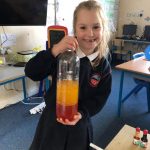
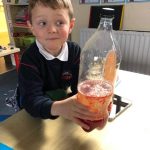
We made lava lamps! We discovered that the oil floats on top of the water because it is lighter than water. The food coloring has the same density as the water so it will sink through the oil and mix with the water. When you add the tablet it sinks to the bottom then starts to dissolve. As it dissolves it makes gas, carbon dioxide. The bubbles then push the oil through the water.
Environmental awareness and care
We have been learning about biodiversity and the importance of insects and bees. Ms Doyle’s infant class created their own wormery to watch the worms in action.
- Take part in Science Week www.scienceweek.ie
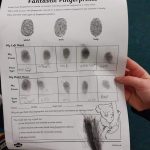
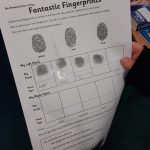
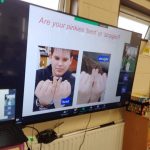
During Science Week we took part in a very interesting webinar all about genetics, DNA and hereditary traits. We looked at our little fingers, ear lobes, hair line, tongue and discussed and discovered the different variations. Later we looked at our finger prints, patterns and other amazing facts.
- Show how pupils have used STEM skills in projects on environment or sustainability
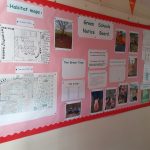
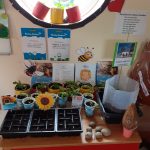
Biodiversity has been our main theme this year for our Green Schools project. We mapped out the areas around the school then went on a trail around the school to identify and note the different species of plants and animals.
We made plans for our wildflower areas, bug logs and insect doors. We also reviewed our past plans to monitor water and electricity consumption. We were also delighted to see that our work on our travel flag led to the council creating a footpath from the village to the school! Sustainable travel is hard in a rural area and the footpath has made such a difference.
3rd-6th class created a sustainable world in Minecraft. Have a look at the video through the link below,
Step 2 : Technology
2 or more examples of the children using Technology as part of their school work.
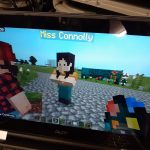
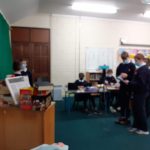
- Minecraft Video : We called this project ‘Building a Sustainable Future’.
Our focus was on the Global Goals and how we can work together to create a safe, sustainable, healthy future for all. Our 3rd-6th created a Minecraft world to show how we can create a sustainable future, where no one is left behind. To do this project we created the world in Minecraft using code to help. We then learned how to screen record and then record sound. We then learnt how to edit videos. Editing is hard!
- Each pupil has their own chromebook which we use daily. We can create slides, personal dictionaries, forms, kahoots, you name it and we can do it! Click here to read a very persuasive piece written by Callum and Filip in 6th class regarding our 10am movement break and here to fill in your response to the piece.
- Green Screen: In the picture above you can see our class creating a play using a green screen and the DoInk app.
Step 3: Engineering
2 or more examples of the children investigating engineering in class.
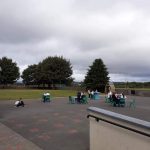
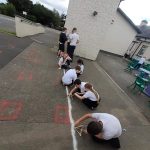
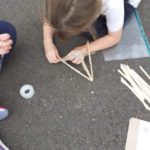
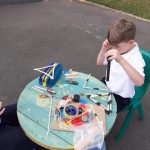
Catapults! Using the experiment guide from the DPS website we created catapults with our groups. We would test the catapults and then make changes to see how to catapult the object further and accurately. The furthest flung paper ball flew just over 8m!
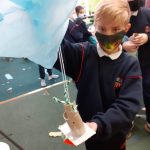
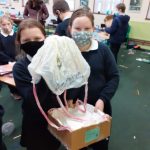
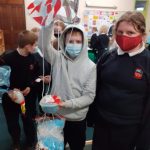
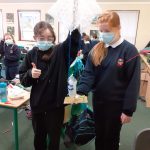
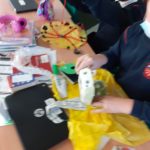
Engineers Week: The Egg Drop Challenge
There were eggcellent parachutes, impact absobers and landing gear on display in our egg drop designs. Nearly all our eggs survived 🙂
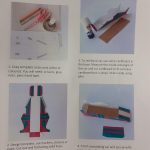
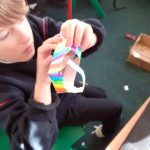
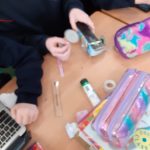
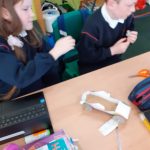
Design and make an electric car. This was a tough one. Groups had to work together to follow the instructions and buld their car properly. Once the engine was working they then had to test, fix, try and try again to get the car going. There were many discussions around balancing the need for batteries and power along with the weight of the car,
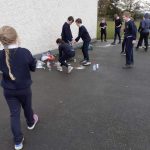 Rocket: Chemical reactions.
Rocket: Chemical reactions.
Mixing vinegar and bread soda to create a rocket out of a vitamin C tube.
There were loads of successful launches including many that were higher than the school!
Step 4: Math
2 or more examples of how the children have applied their maths knowledge and skills in practical ways
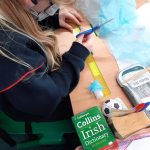
Each of our design and make projects seen in step 3 require ordering, measuring distances, capacity, weight, recording and analysing data.
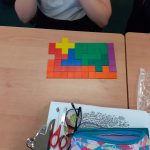
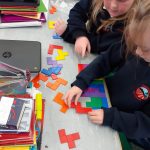
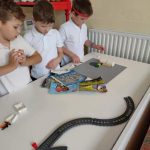
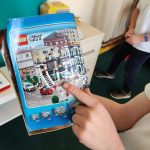
In math we have our 6 Bricks Club and hands on problem solving.
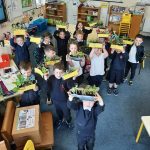
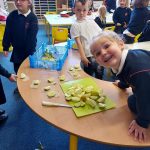
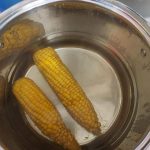



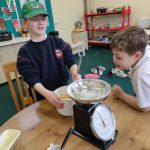
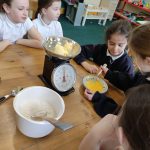
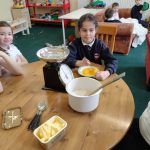
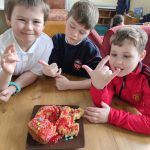
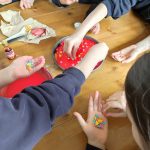
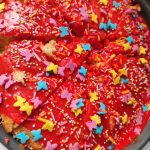
Baking in the Nuture Room: this is a regular favourite for us! Always lovely aromas coming from there. Recipes mean reading, understanding and following instructions. Weighing, measuring, counting, adding and then sharing out the final product is all part of the fun!
Step 5: Showcase
Provide evidence for one or more example of how the children have presented and explained their STEM work to others.
Our Infants class visits each class in the school to tell us how we can help save the bees and encourage biodiversity at home. You can even see our very own bee mascot in the picture below. We also have a school garden page on Instagram sharing with all our followers what we are growing in the garden as well as our work on biodiversity and saving the bees.
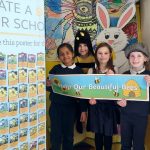
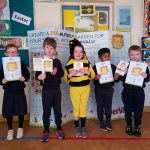
Our Green Schools Committee presented their work and future plans to our supervisor from An Taisce. We hope to find out soon if our application for our fifth Green Schools Award is successful. Wish us luck!
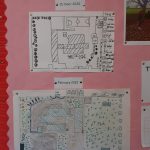
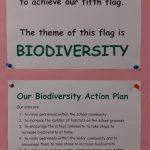
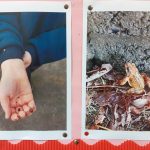
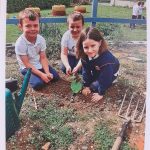
OUR SCIENCE LOG 2019 -2020
- Living things
- Living Things
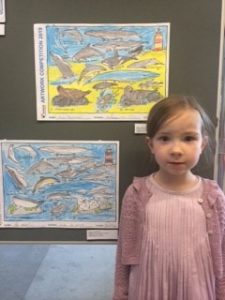
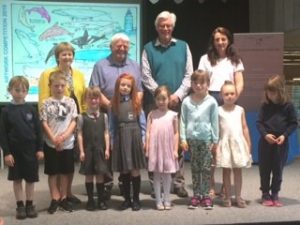 Well done to our winner in the Wexford County Council Environmental Awareness colouring competition. The prize was presented by Don Conroy!
Well done to our winner in the Wexford County Council Environmental Awareness colouring competition. The prize was presented by Don Conroy!
Energy and forces 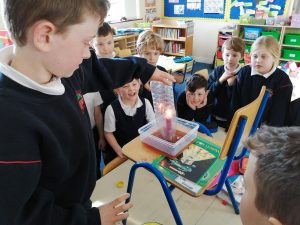
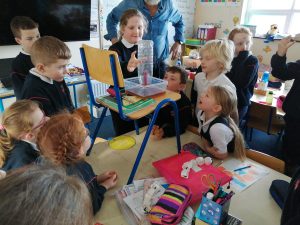
- Energy and forces
Materials - materials
- Environmental awareness and care
- Environmental Awareness and Care
- Participate in Science events
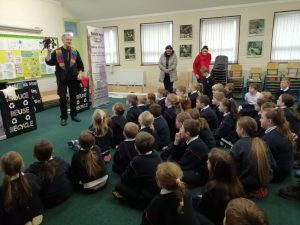
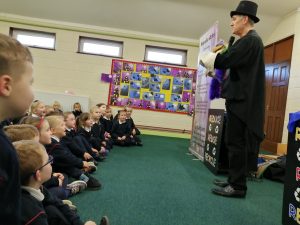
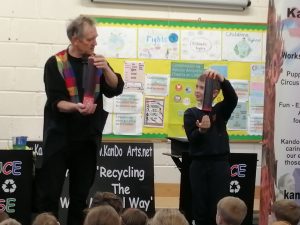 Melvin the Magician visited us in October. We had great fun learning about Recycling Magic.
Melvin the Magician visited us in October. We had great fun learning about Recycling Magic.
Invite a Science speaker to your school
Visit an SFI Discover Centre: Little Harvard Medical School (Brickz for Kids) came to visit earlier this year. We learned about the heart, brain and spine. It was brilliant!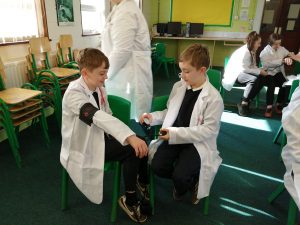
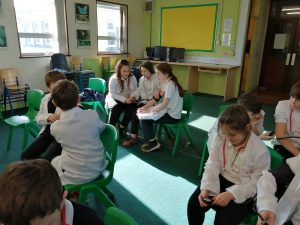
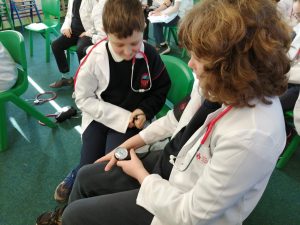
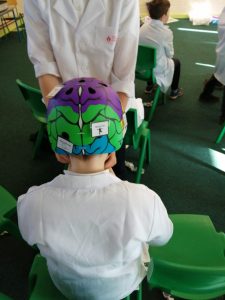
Step 2: ICT (Technology)
- 2 or more examples of the children using Technology as part of their school work.Examples can include:
- Record and analyse data collected e.g. a spreadsheet or graph
- Click on these links to try some of our surveys:
- https://forms.gle/fJYv87Lzx1e6MSMe7
- https://forms.gle/r574THmKeHJZ47JUA
- Use different materials e.g. wood, metals and plastics, for design and make projects
- Design and Make
- Take part in coding and computer science projects: National Scratch Competition www.scratch.ie,
- Coding
Step 3: Engineering
PLAQUE OF STEM
2 or more examples of the children investigating engineering in class or in the local area.
- Design and make activities. One of our challenges for science week was to create a Rube Goldberg Machine. These are pretty impressive.
- Investigate Engineering: Bridges
Step 4 Math
DPSM PLAQUE OF STEM EXCELLENCE
- 2 or more examples of how the children have applied their maths knowledge and skills in practical waysExamples can include:
- Use Maths skills and knowledge as part of Science, Technology, Engineering/design and make, or other activities such as baking or gardening
-
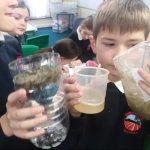
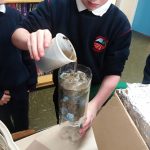
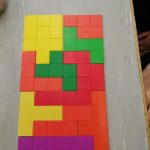
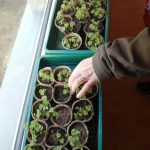
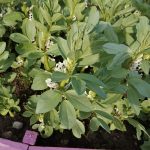
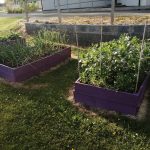
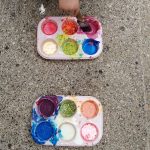
- Take part in Maths Week 2018 www.mathsweek.ie. 4th, 5th and 6th class took part in an international Math Skype organised through WIT. Math Week Target Boards.
We created Radial Name Art: Exploring vertical, horizontal and diagonal symmetry using our names as inspiration.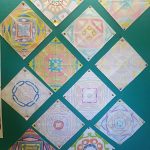
- Develop a Maths trail around your school
As a part of Maths Week we developed a maths trail around the school based on 2D Shapes, 3D Shapes and lines and angles.
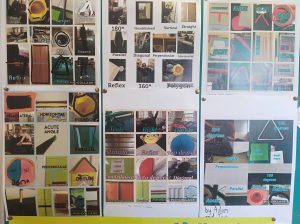
OUR SCIENCE LOG 2018 – 2019
Living things
We currently have three beds for planting and growing.
We will have another three beds to plant and grow after the Easter holidays!
Here we learn how to plant and grow our own food. We then use the food to cook, share and enjoy together. Our Infants class made the most delicious vegetable soup. What we don’t eat or use, we leave for others in the community to use. Donations received into our trust box are then reinvested in to the garden.
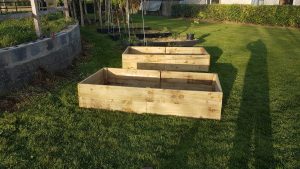
We have just completed our sensory garden at the front of the school. There are things to see, taste, smell, hear and touch in our garden. We can’t wait to see how it grows!
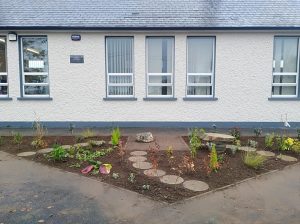
Our 6th class worked with our Infants class to help them plant carrots, spinach and cress seeds.
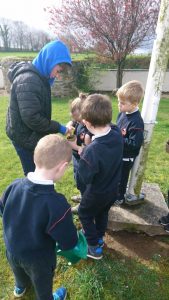
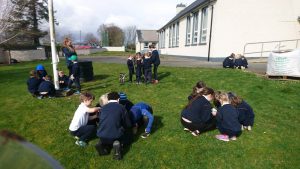
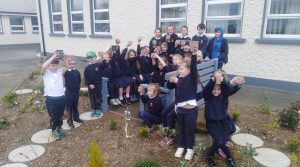
Our lungs: we learned about how our lungs work and then recreated a model lung using a bottle, straw and balloons.
-
Living things:balanced, healthy diet
-
Human life processes • develop an awareness of the importance of food for energy and growth need for a balanced and healthy diet structure and make a nutritious lunch
Brunch
Following a series of lessons in healthy eating and to continue to promote healthy lunch boxes, the Health Squad organised a whole school brunch. The senior class made pancakes and organised and served the entire brunch! There was porridge with honey, the most divine strawberries donated from Greenhills Farm and mini-omelettes which went down a treat. The whole school ate together, enjoying both food and company!
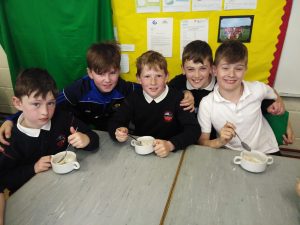
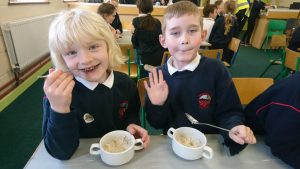
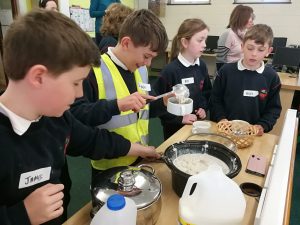
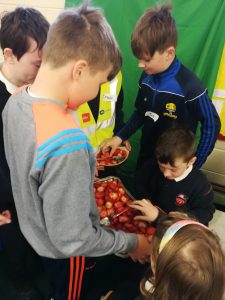
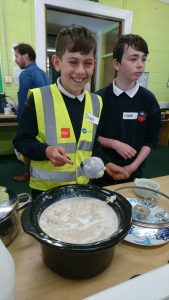
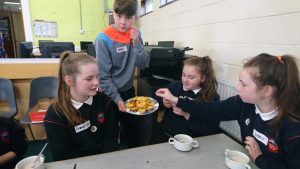
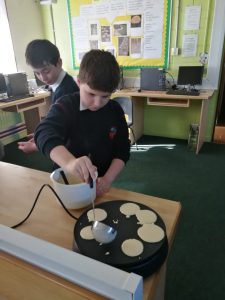
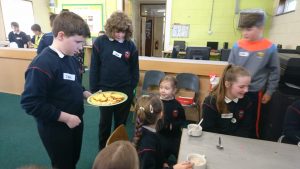
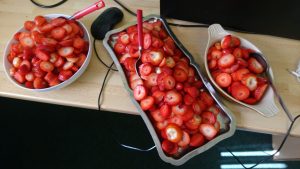
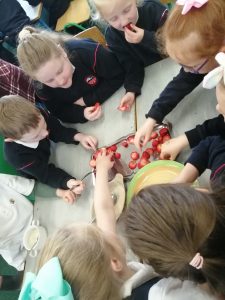
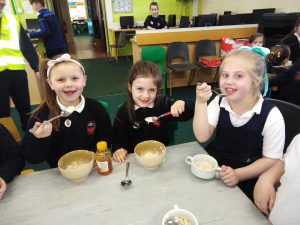
We had a visit form our local Fire Brigade and they told us all about fire safety and how to stay safe around fire and hot objects.
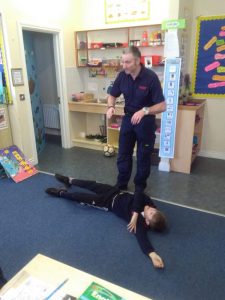
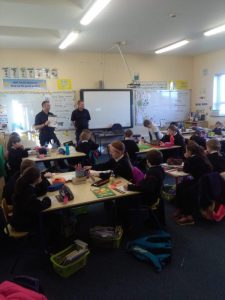
Ms Ratcliffe, our very own nurse, came to visit the Infants for Aistear. They had been learning about the body and a visit to the Doctor in Aistear (Integrated Learning Through Play). Ms Ratcliffe showed everyone how to take their blood pressure and how to listen to the heartbeat and pulse.
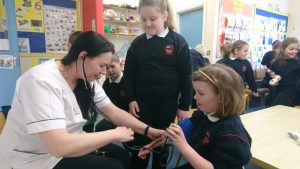
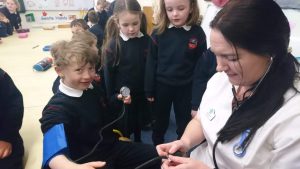
Energy and forces
We had a visit from Bricks for Kidz following our block of work on Climate Change and sustainable living. We investigated and learning about wind power and created our own wind turbines.
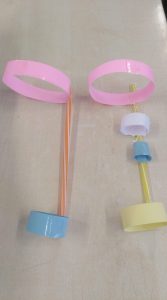 We created and tested a number of different types of airplanes. The circle ones flew the furthest!
We created and tested a number of different types of airplanes. The circle ones flew the furthest!
Our Infants class investigating magnetism.
Materials
Here we mummified an apple using baking soda. It is similar to natron which was the salt used by the Egyptians to mummify. We discovered that the soda absorbed all the moisture from the apple so it dried out and shrunk but didn’t go off.
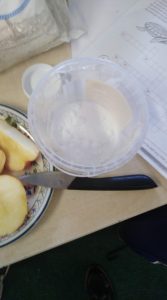
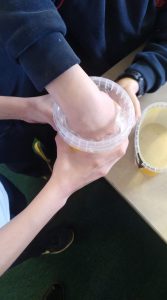
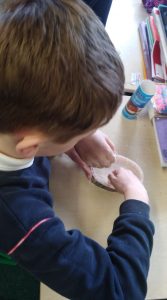
Mixing and changing: Weighing and measuring to make pancakes. Yum!
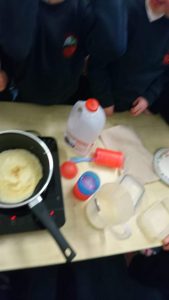
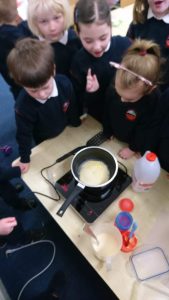
We used a recipe from a magazine to bake gingerbread. We discovered how important it is to follow instructions correctly. The one waving at you had way too much bicarb of soda in him!
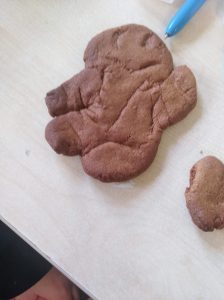
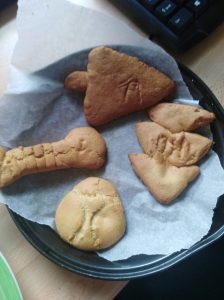
We learned about Climate Change and the melting of the polar icecaps. We used bubble wrap to copy the Greenhouse Effect and then placed them in the sunshine. After two hours the red box, which had been wrapped was completely melted but the yellow one had only melted a small amount. We could see that our red house had been flooded.
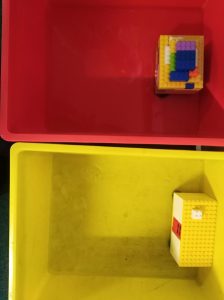
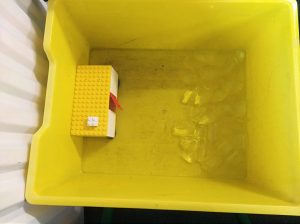
Following a visit from the local Traffic Corp and a block of work on road safety we discovered that the EU made seatbelts mandatory and that they had saved thousands of lives. We designed and tested a number of egg-cars with restraints in an experiment called ‘How to prevent egg-cidents’. Egg Sheeran survived!
Environmental awareness and care
During the year we discovered that the school water supply had been contaminated and we couldn’t drink it for quite a while. We learned about water quality around the world and investigated simple ways to clean water. We all agreed that even though our solutions cleaned out dirt, it did not kill germs or bacteria. One group discovered that UV light can do this and set up a foil surround that would catch the sun and focus UV light on the water.
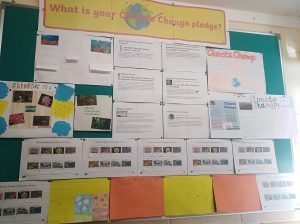
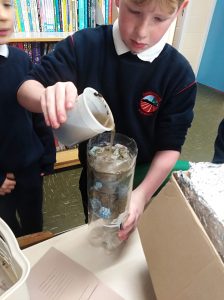
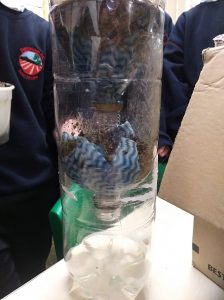
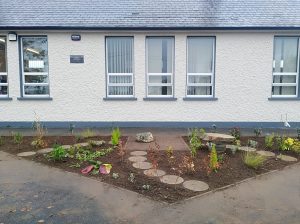
This is our new sensory garden. We use it to learn about the senses. There are things to see, taste, hear, feel and smell.
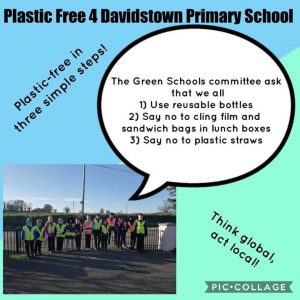
We are a Plastic Free School!
See our blog https://sites.google.com/view/davidstownpupils/climate-change for more.
Davidstown PS Walkability Audit Report
Invite a Science speaker to your school. Visit an SFI Discover Centre.
We had the most amazing visit from the Seal Sanctuary Ireland. Jesh and Ffion told us all about the species of seals around our coastline and how they can be injured and then brought through the recovery process. We adopted two seal, Egg and Sundae. Egg is particularly special as he has only one flipper. The other was damaged beyond repair by discarded fishing nets. We learned so much for Jesh and Ffion and their visit inspired us to become a plastic free school.
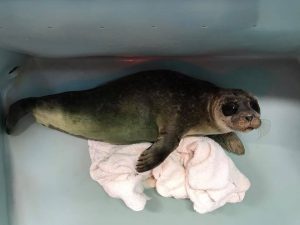
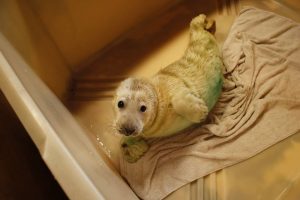
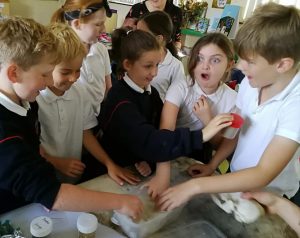
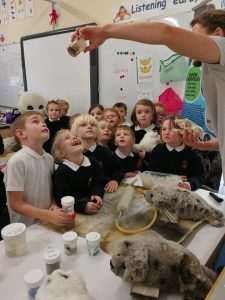
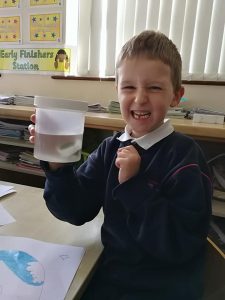
Step 2: Technology. Two or more examples of the children using Technology as part of their school work.
4th – 6th Class created a blog about our work on Climate Change and our decision to become a #plasticfreeschool
https://sites.google.com/view/davidstownpupils/climate-change
We entered the Brabras Computational Thought Competetion
We use Google’s CS First to learn how to code using Scratch. Click on the link to see one of our pupil’s creation. It is his take on a popular online game.
https://scratch.mit.edu/projects/201158376/
Using Kahoot
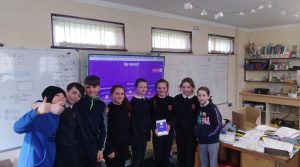
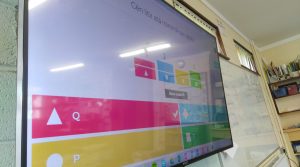
We had a visit from Film Maker Therese Dalton who gave us plenty of practical advice on digital storytelling. We then put that advice into action.
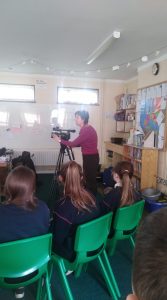
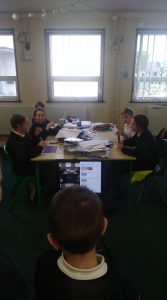
-
Safer Internet Day
We took part in Safer Internet Day and explored our Digital Footprint. We also focused on staying safe online as well as preventing and dealing with cyber-bullying.
Step 3: Engineering
- PLAQUE OF STEM2 or more examples of the children investigating engineering
- Design and make activities


- Organise an event during Engineers Week 2019
Julie and Chris from Engineers Ireland came to visit us during Engineers Week. They told us about their work and how they became engineers. We did a number of experiments such as water fountains, bridge building and creating a prosthetic hand!
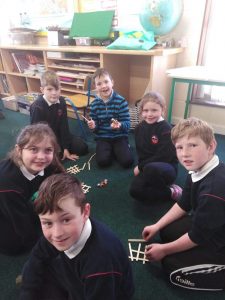
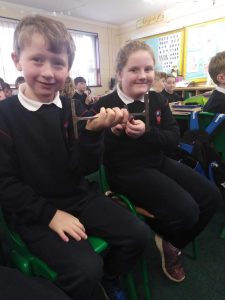
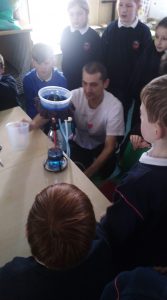
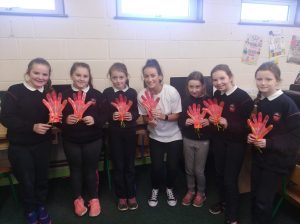
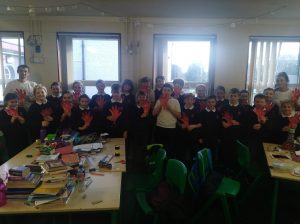
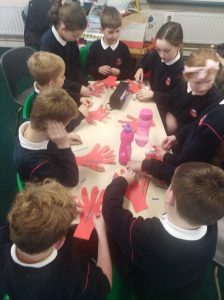
Step 4 Math
DPSM PLAQUE OF STEM EXCELLENCE
- 2 or more examples of how the children have applied their Maths knowledge and skills in practical ways
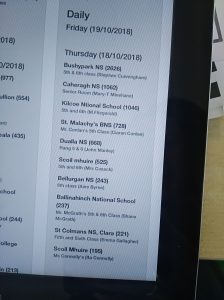
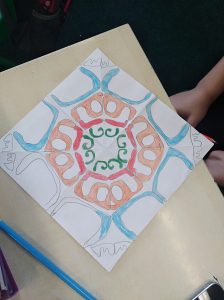
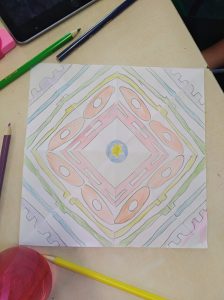
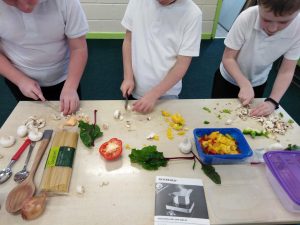
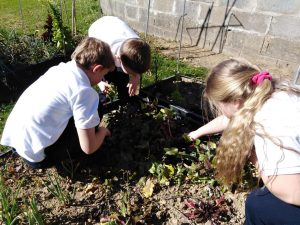
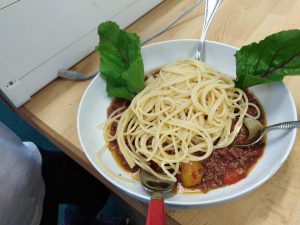 We love to cook and bake in our school. We use cooking and baking for sensory activities as well as for math to measure and in science to explore materials and change such as melting, cooling, mixing and separating.
We love to cook and bake in our school. We use cooking and baking for sensory activities as well as for math to measure and in science to explore materials and change such as melting, cooling, mixing and separating.
Use Maths to record and analyse your science investigation results where appropriate.
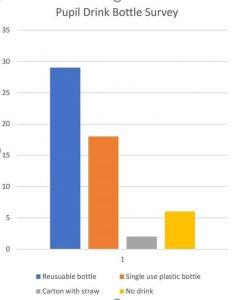

When we became a plastic free school we began to count and create statistics around how we were achieving our plastic free goal. See our twitter page for more.
Take part in Maths Week 2018 www.mathsweek.ie. Look! There’s Scoil Mhuire, Davidstown on the leader board!

Step 5: Showcase
DPSM PLAQUE OF STEM EXCELLENCE
Choose one or more of the following:
- Show evidence of the children presenting their science work to other classes in the school.
We create animations and video to present our work to our school mates and our classmates around the world!
As a part of Maths Week our 3rd and 4th classes designed math games for the Infants class using LEGO. They did a fantastic job and created the most wonderful games based on counting and sorting.
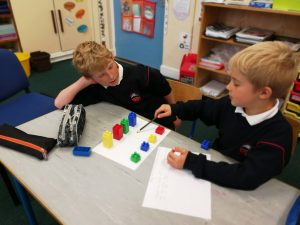
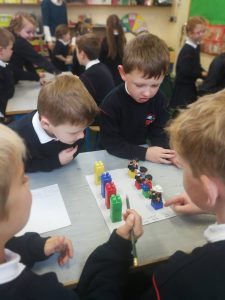
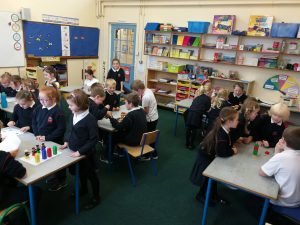
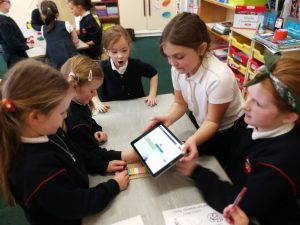
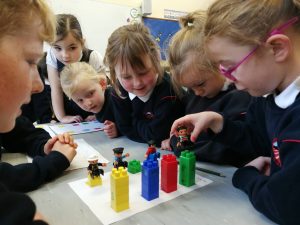
- Hold a science open day or evening to present your work for the school, parents or the wider community
We will have our Science Exhibition on our Flag Day in June when we will celebrate receiving our Green Flag, our Health Promotion Flag and our Digital School of Distinction status as well as showcasing our work as a Creative School.
OUR SCIENCE LOG 2017 – 2018
Step 1 Science
6 hands-on science investigations
-
Living things:balanced, healthy diet
-
Human life processes • develop an awareness of the importance of food for energy and growth need for a balanced and healthy diet structure and make a nutritious lunch
Brunch
Following a series of lessons in healthy eating and to continue to promote healthy lunch boxes, the Health Squad organised a whole school brunch. The senior class made mouth-watering brown bread, the junior class whipped up some delicious butter and a few committee members squeezed a lot of oranges so we could sample fresh orange juice. The porridge, with toppings such as strawberries, banana, raisins and honey, went down a treat. The whole school ate together, enjoying both food and company!
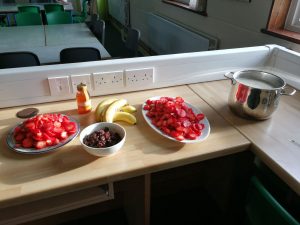
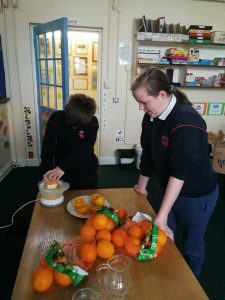
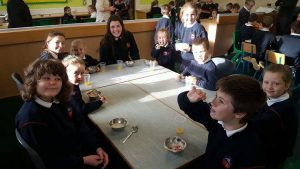
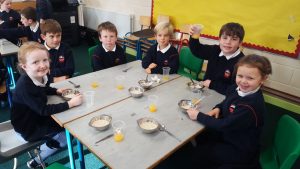
3. Environmental Awareness and Care: School Garden
We plant, grow and harvest our fresh vegetables and sell our goods but not without sampling the food ourselves of course. We reinvest the money made to further develop the garden.
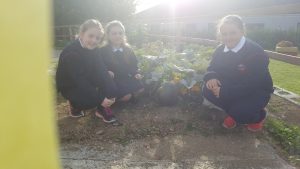
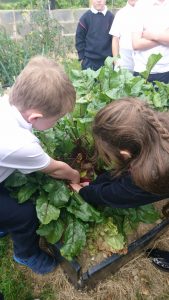
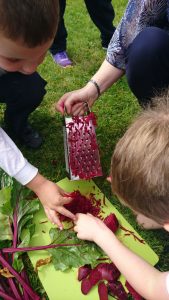
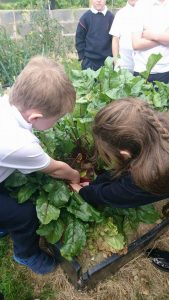
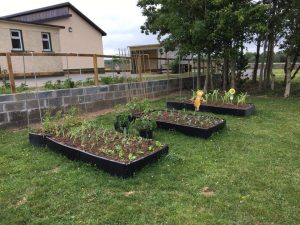
School Garden
We started from scratch and weren’t afraid to get our hands dirty! We cleared overgrown spaces, built flower beds and planted hundreds of seeds. We will continue to work together to develop our school garden.
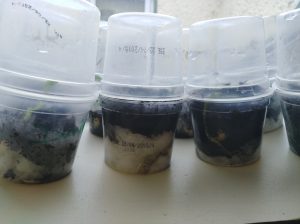
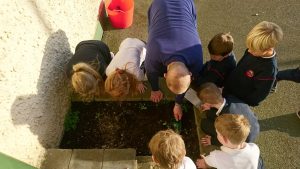
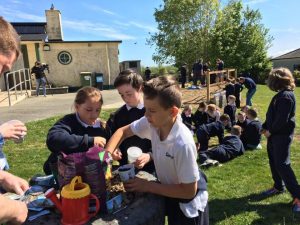
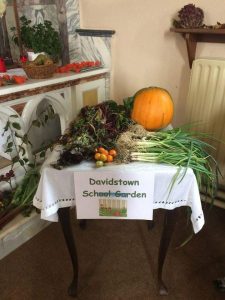
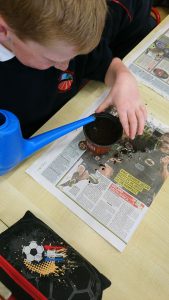
Outdoor Classroom
4. Living things: Mini Beasts Insect Hotel and Hedgehog House
Our amazing insect hotel and hedgehog house are open and ready to house many mini guests!
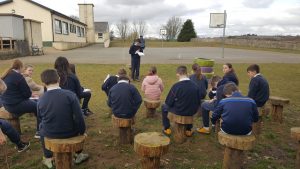
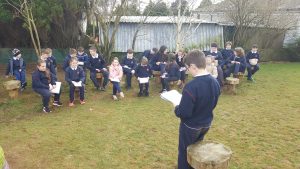
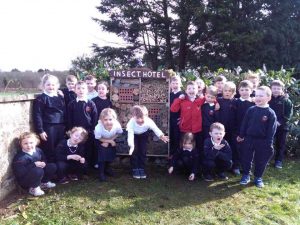
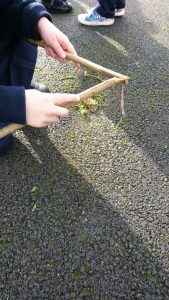
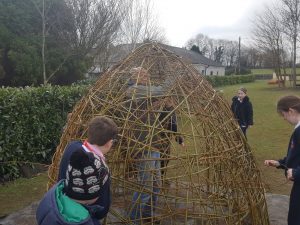
We also recently added to our outdoor classroom with the creation of a willow hut. 3rd to 6th class created the hut themselves with the help of Terry the Weaver. We have some stalks of willow in the classroom and we can see how shallow their root system actually is. The hut will become a habitat for wildlife and minibeasts.
5. Energy and forces: Design and Make: Catapult
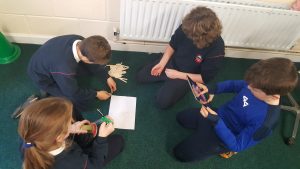
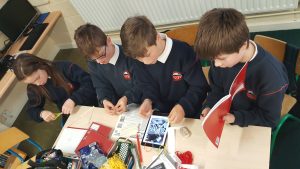
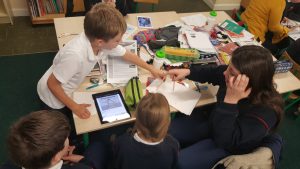
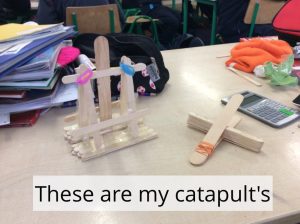
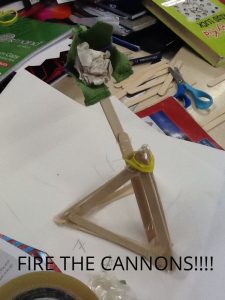
We first looked at different catapult designs and made test catapults. We designed our catapults and then we made them. The best bit was testing them! We had a bucket in the middle of the room as a target to test distance and trajectory and circles on the wall to test for accuracy.
6. Materials: materials and change. Investigating mixing and reactions.
We mixed baking soda and vinegar in a vitamin tube. They reacted causing a gas to build up in the tube and then the pressure built up and the rocket took off!
We also experimented with how mixing and heat can cause changes too. The senior room baked brown bread and the junior room made butter. Then we ate it all!
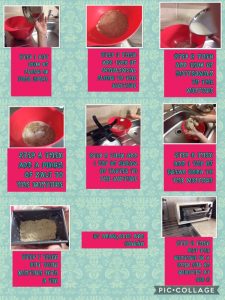
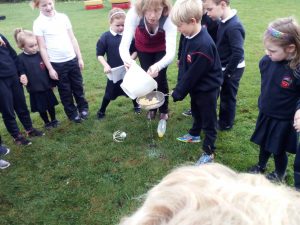
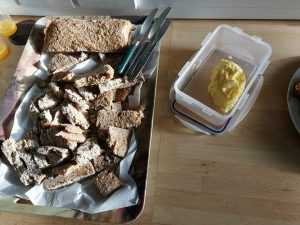
7. Environmental awareness and care: Green Schools Programme, Walk for Water, brushing teeth experiment
Teeth Brushing Experiment
We recorded the amount of water we use when we leave the tap on and turn the tap off while brushing our teeth. We found that turning the tap off uses 93% less water!
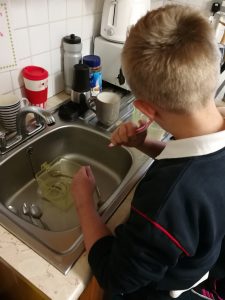
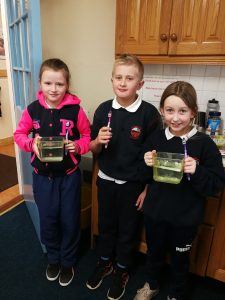
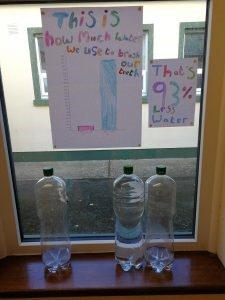
Water Displacement Devices
We put weighed water bottles into every cistern. This reduced the amount of water use per flush by 500ml!
Water Butt
We purchased a water butt and plan to use the rainwater collected to water the flowers, fruit and vegetables in our school garden.
Water Use Posters
Other:
- We bought basins for the classroom and staffroom sinks.
- We put a jug in the fridge. Pupils and staff can refill their water bottles with cold water without having to run the tap.
- We no longer use the washing machine. The towels were replaced with recycled paper which can be composted.
- Tallied and graphed the Home Survey results.
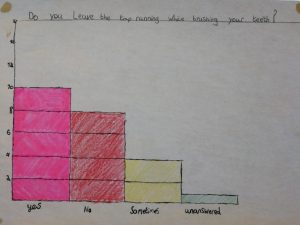
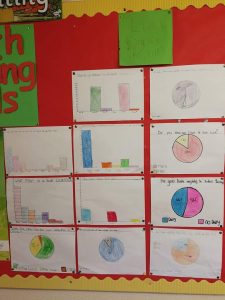
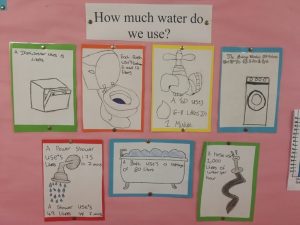
Blue Day
Our Day of Action took place on the 23rd of March 2018. We all wore blue!
Walk for Water
We took part in the national Walk for Water Campaign. We raised awareness about water scarcity in developing countries by going for a walk carrying items that symbolised water. It really opened our eyes!
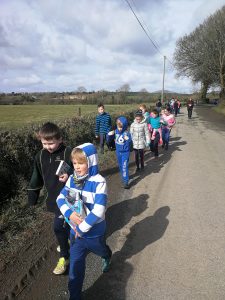
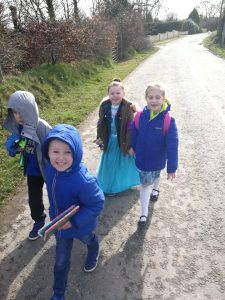
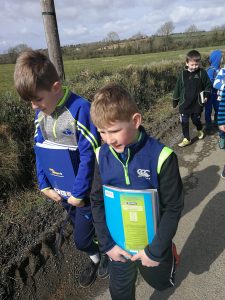
Water Treasure Hunt
As a part of our World Water Day celebration we did a water scavenger hunt around the school. Each team had a map and an iPad. At each point on their map was a question and the answer was located at the correct spot on the map. Each team had to take a selfie to prove they had found each answer!
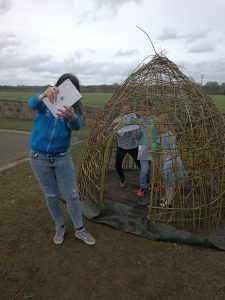
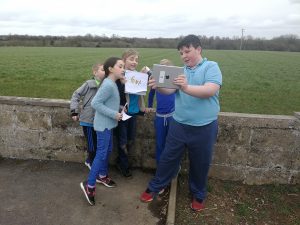
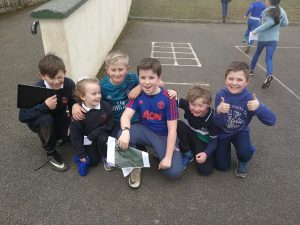 The Winning Team
The Winning Team
-
Invite a science speaker: James Carton
Dr. James Carton, assistant professor at DCU came to speak to us for Engineers Week. He told us all about his work with NASA and the European Space Agency. We saw the most amazing videos of Dr Carton on a weightless flight! He told us all about his work and helped us with our Engineers Week Challenge: The Egg Drop Challenge!
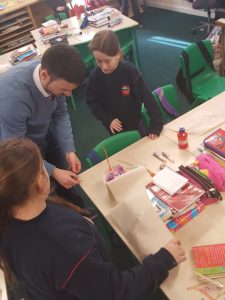
-
Participate in science events or projects: Leave no Trace
Eoin from Leave No Trace came to speak with us during Science Week about his work in engineering and about environmental awareness and care. We learned all about the Leave No Trace movement and what exactly that meant when you were going to be camping or trekking.
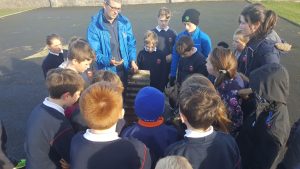
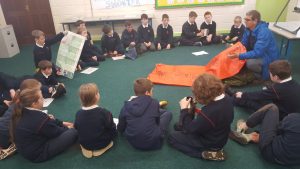
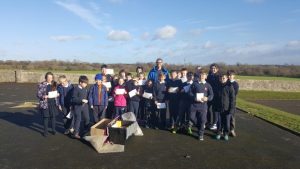
-
Attend or host a Science Week event
During Science week Brickz for Kids made a visit to the junior classroom.
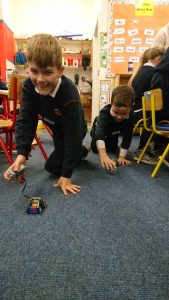
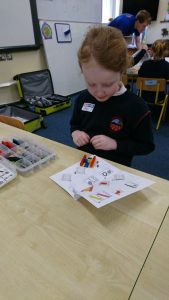
-
Hosted a Space Week event
For Space Week we created a range of videos about Space. See below for more!
Step 2 Technology (ICT)
2 or more examples of the children using ICT
-
Participate in the Irish Computer Society Scratch programme at http://scratch.ics.ie/
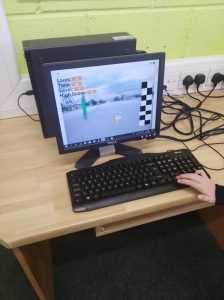
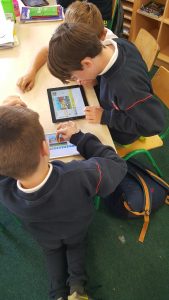
Once we had learned a bit about how to code with Scratch we had our first challenge; to create a Crossy Road game! We had to have variables like lose a life, score points and go to a new level.
We also love showing our junior buddies how to use apps like Scratch Jr.
-
Evidence of the students developing a video
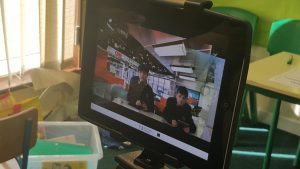
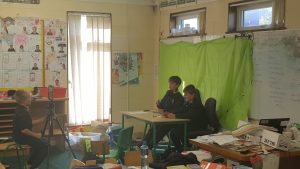
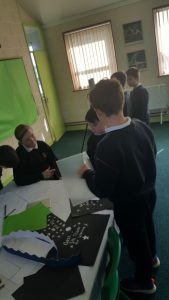
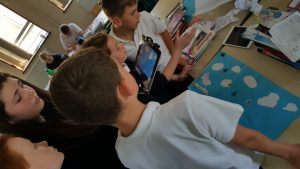
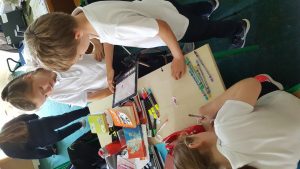
To celebrate Space Week we created videos all about different aspects of space. Videos included the story of ‘Laika: First Dog in Space’ and ‘Trump: Evacuation Earth’. In this video or trio of scientists went throught our solar system explaining which of the planets would be best for the immediate evacuation from Earth!
As a part of a different project we learned how to use green screen technology, how to create effects and edit video, image and sound using iMovie as well as learning how to create stop-motion animation.
-
Use technology to access a range of science/engineering/maths information
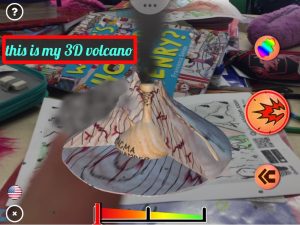
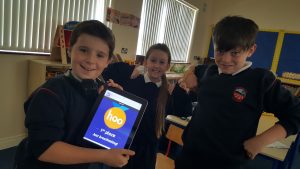
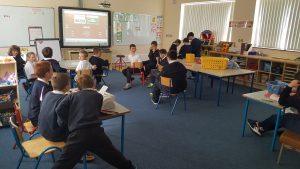
We use an augmented reality app called ‘Quiver’. Here we are using the app to investigate volcanic eruptions. We also regularly use Kahoot to test our knowledge in both doing them and making them for others to try. We use the iPads and PCs everyday to investigate and answer our questions.
-
Safer Internet Day
We took part in Safer Internet Day and explored our Digital Footprint. We also focussed on staying safe online as well as preventing and dealing with cyberbullying.
Step 3 Engineering
2 or more examples of the children investigating engineering in class : Maker Space
- We call it our Maker Space. We have one Major Maker Space a month where we explore, plan, design, make and evaluate our task. So far our challenges have included helicopters, a rocket, a catapult, a marble run and the egg drop challenge.
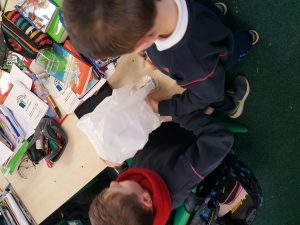
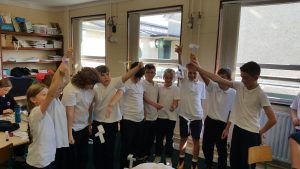
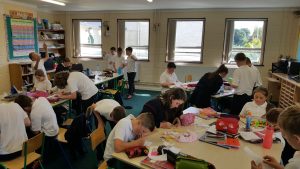
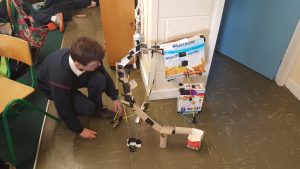
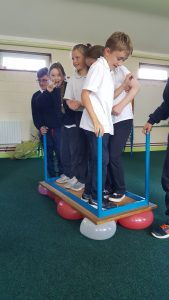
Egg Drop Challenge Helicopters Marble Run Air Pressure
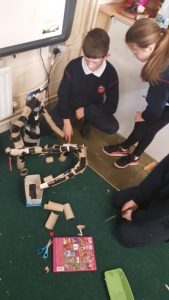 For the marble run challenge we got points for each right angle and per cm of height at the start of the run.
For the marble run challenge we got points for each right angle and per cm of height at the start of the run.
-
Invite an engineer to the school to speak to the children about their work:
- Dr James Carton, https://twitter.com/EAASolutions https://twitter.com/EAASolutions/status/972240805900574722
- Eoin from Leave No Trace
- Garrett Kehoe from the ESB

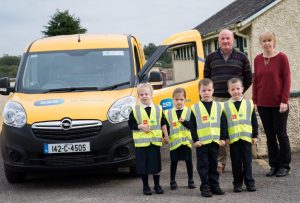
Step 4 Maths
2 or more examples of the children using their maths skills as part of their science work
Healthy Eating
Lunch Surveys
We conducted a survey on the school lunches. Third and fourth class tallied and recorded the results. We found that
- 83% of the pupils had fruit in their lunchbox
- 3% had vegetables
- 44% had dairy
- 79% had either chocolate or biscuits.
Most lunchboxes had a white bread sandwich while apple was the most common source of fruit.

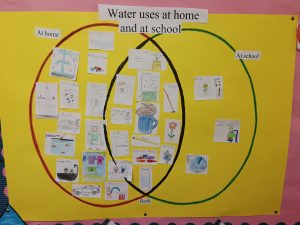
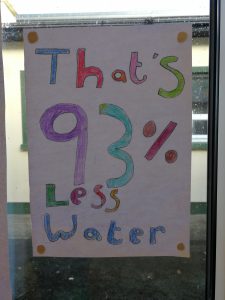
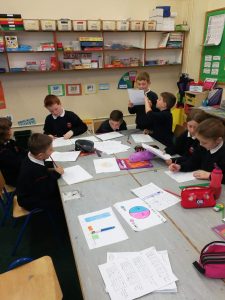
Recording and analysing data:
Home Water Surveys
The committee wrote a survey on ‘Water Usage at Home’ and asked their parents to kindly fill it in. We got a huge response and found that our parents have a good general awareness of water conservation.
Other findings:
- There is little awareness of reasons to conserve water among students.
- In the staffroom, the tap is left running while the dishes are being cleaned.
- When refilling their bottles, a lot of student leave the tap running waiting for the water to cool.
- In the classroom, the tap is left running while washing up after art.
- A hose is used to water the garden.
- Water left in the kettle is thrown away the next morning.
- The washing machine is put on once a week.
- The dishwasher is not used.
- The following cleaning products were used: Fairy Washing up liquid, Flash and Domestos.
- There’s no policy on water and water conservation and for the use of non-hazardous cleaning products.
- Rainwater isn’t harvested in the school.
•Using maths skills and knowledge as part of science: recording and analysing data. Using maths operations; ratio, percentages, averages –
Bottle flipping: We used bottle flipping to explore probability, fractions, decimals and percentages as well as statistics. We discussed the probability involved, the variable that could affect the outcome and how to record our results using a tally. We then flipped the bottle 20 times each. Then we calculated the success rate as a fraction of the total flips and then as a percentage. We then figured out the ratio of successful to unsuccessful flips.
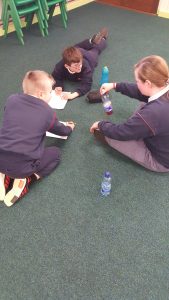
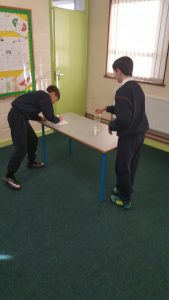
Our Maths Week events: We based our Maths Week event around
- Mathletics: We loved using Mathletics in the run up to World Maths Day. We had great fun playing our math games against pupils from all over the world!
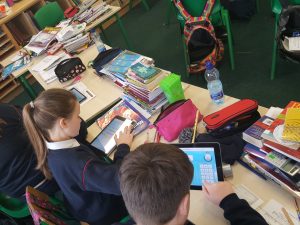
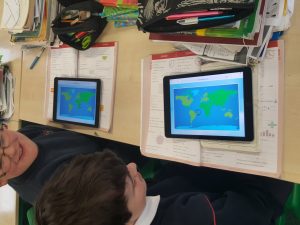
- Computational Thought
This year we took part in the Bebras Computational Thought Challenge and we were thrilled that Adam from 4th Class made it to the National Finals in Maynooth University!
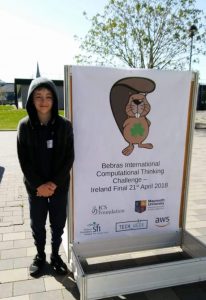
- Developing a maths trail around school


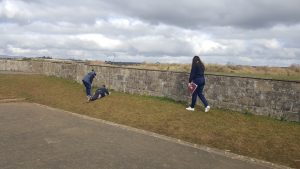
Although we started developing our Maths Trails a few weeks ago, the weather has been against us and we haven’t completed them yet! We will!
Step 5 Stem Showcase
We will hold a science open day or evening to present our work for the school, parents and the wider community on June 18th. As a part of this day our pupils have picked a number of experiments based around electricity, electronics and programming which they will demonstrate and then encourage our visitors to have a go! There will be 7 stops on the trail.
- Simple and parallel circuits
- Electric Quiz
- Scratch
- Makey Makey and Scratch
- Rockets
- Robots
- Solar Cars

